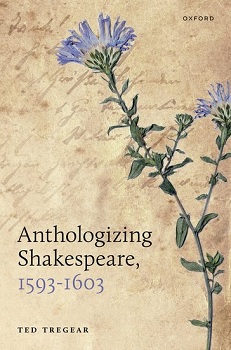Dr Ted Tregear, Gonville and Caius
tt335@cam.ac.uk

Biographical Information
I am a Research Fellow at Gonville and Caius College. I was born and educated in London, before coming to study at Trinity College, Cambridge, for my BA. After a year in Oxford, where I received an MSt in Renaissance literature, I returned to Cambridge to write a PhD thesis on Shakespeare. From 2022-24 I will be working as a Lecturer at the University of St Andrews, before serving out the last year of my fellowship at Caius.
Research Interests
My first book, Anthologizing Shakespeare, 1593-1603, set out to explore Shakespeare’s engagement with the culture of quoting and commonplacing in which his works appeared. From 1599 onwards, passages from his poems and plays began to feature in a handful of printed anthologies, alongside extracts on similar themes by his rivals and contemporaries. These anthologies can offer new perspectives on the formative works of his first decade in print, from Venus and Adonis, a favourite of the collections, to Hamlet, written just after they appeared. I argued that Shakespeare was keenly attuned to this way of reading, anticipating this sort of reception for his writings, and relishing the poetic and dramatic possibilities it opened up.
I am - tentatively - starting work on a two new projects. The first is an attempt to salvage whatever truth inheres in the long-established and long-discredited moniker of 'metaphysical poetry'. That label is often disregarded as an anachronism. In fact, though, for almost as long as the poetry we call 'metaphysical' was being written, the word 'metaphysical' has been used of it - generally with far from positive connotations. By reading a selection of poets, from Shakespeare and Donne to Katherine Philips and Abraham Cowley, my project asks what is metaphysical about metaphysical poetry. It asks how this affinity between metaphysics and poetry might redefine both terms, at once reinvesting poetry with a peculiar cognitive content, and rediscovering in the seemingly immaterial domain of the concept a wealth of more urgent material and practical struggles.
My second new project sets out to look at different kinds of artistic labour in early modern Europe. I am interested in how certain artists, from Michelangelo to Milton, thought about the work they did, and how that work is remembered or forgotten in the artworks they produced. The material basis of work, along with the social relations it implied, were changing throughout the Renaissance; as a work whose proximity to idleness was legendary, and whose very status was questionable, art might offer a distinctive sphere in which those changes were examined and contested. I want to find out how, under these pressures, art's work was represented by artists, and how it could be inflected by questions of class, gender, politics, and religion.
Other topics of research include the reception of classical texts; early modern poetics and literary theory; literary form and formalism; and the possibilities of reading Renaissance texts in relation to psychoanalytic and social theory. Most broadly, I am interested in how Renaissance literature can be read with an eye to the social and material world in which it was formed. Outside the period, I like to think about German philosophy from Immanuel Kant to Theodor Adorno; Karl Marx, and the writings of Marxist theorists on social, economic, and aesthetic questions; and classical music, from the fifteenth century to the present.
Most of my teaching over the past three years has focused on Shakespeare, Renaissance literature, and practical criticism, for Parts I and II; but I have also supervised undergraduates for the Tragedy and Lyric papers, as well as giving classes on literary theory and on the visual arts. I am happy to work with students on any of the research interests above.
Selected Publications
Books
Anthologizing Shakespeare, 1593-1603 (Oxford: Oxford University Press, 2023), here
Articles and Chapters
'Shakespeare's Metaphysical Poem: Allegory, Metaphysics, and Aesthetics in "The Phoenix and Turtle"', Review of English Studies 74.316 (2023), 635-651 (here)
'Hope against Hope: Abraham Cowley and the Metaphysics of Poetry', English Literary History 90.4 (2023), 979-1006 (here)
'The Work of Conjoining', review essay on Michelle O'Callaghan, Crafting Poetic Anthologies in Renaissance England, and Megan Heffernan, Making the Miscellany, Spenser Review 52.1 (2022), here.
'Shakespeare's Poetry in the Early Modern Anthologies', in The Oxford Handbook of Renaissance Poetry, ed. Jason Scott-Warren and Andrew Zurcher (forthcoming)
'Marvels and Commonplaces in the Elizabethan Anthologies', Classical Receptions Journal 13.1 (2021), 49-66 (here)
'Music at the Close: Richard II in the Elizabethan Anthologies', Studies in Philology 116.4 (2019), 696-727 (here)
'Mourning Thomas Kyd's Lost Works', SEL: Studies in English Literature 1500-1900, 58.2 (2018), 307-330 (here).
Reviews
Review of Fredric Jameson, Allegory and Ideology, Marx and Philosophy Review of Books (August 2020, here)
'End of the Line', review of The Penguin Book of the Prose Poem, ed. Jeremy Noel-Tod, Cambridge Quarterly 49.1 (2020), 86-95 (here)
'Opaque Origins', review of Christopher Pye, The Storm at Sea: Political Aesthetics in the Time of Shakespeare, Cambridge Quarterly 47.1 (2018), 90-98 (here).

